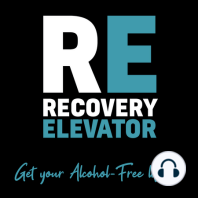43 min listen
RE 175: Anxiety and Alcohol
ratings:
Length:
57 minutes
Released:
Jun 25, 2018
Format:
Podcast episode
Description
Alcohol and Anxiety Today we will look at anxiety and the role it plays in alcohol addiction. Anxiety is inevitable, but we can change what we do and feel about it, ultimately affecting the level of severity we experience and the frequency of attacks. It shows that we care about what is going on. Anxiety is a tool we inherited from our prehistoric past that let us know that we were in danger. It is useful and necessary, and is a natural part of life. Unlike normal anxiety, chronic anxiety does not have roots in the present moment. Chronic anxiety begins when the anxiety becomes our default modus operandi. The conscious mind focuses on the anxiety, fueling it and allowing it to expand and become consuming. We find ourselves on a hamster wheel of potential causes, cures, analyses, and ultimately, fear and discomfort. It surfaces for, as far as we know, no apparent reason. We make attempts to repress or sidetrack it. Drinking is one way that many try to deal with their anxious feelings. While we are drinking, it feels like our problems temporarily disappear. When we look more closely at the way alcohol changes brain chemistry, we see that all it does is slow us down and weaken our higher faculties. In the relatively short long term, alcohol usually makes our problems worse by increasing our anxiety and having a negative impact on our overall health. We have the ability to naturally rewire and change our brains. When we make the decision to quit drinking, over time we can reverse many of the negative effects on our brain chemistry and overall health. Our brains are able to find a new and more healthy version of homeostasis with less anxiety, less depression and more clarity. Chris, with almost 1 year since his last drink, shares his story SHOW NOTES [11:40] Paul Introduces Chris. Chris is 36 years old, a power plant operator, lives in North Dakota. He's married with two kids and a dog. He enjoys camping and boating, cooking, photography, and woodworking. [13:40] What is camping like now that you don't drink? Alcohol took over his life. Now he feels more present for his kids. He feels his life is more enriched. He enjoys more of nature. He is happy to have quit. [16:00] When did you first realize that you had a problem with drinking? A while ago. He craved it since he started in high school. It started social, and it gradually progressed. In the military, he went to Korea when he was 21. Being far away from friends and family was difficult and and he drank more. He suffered from “terminal uniqueness”. He felt he was different from the people around him. We lie to ourselves and focus on the differences, further isolating ourselves from the community around us. [23:55] Did you ever have a rock bottom moment? How much were you drinking? He was drinking a case of tall beers almost every week. His wife had been giving him ultimatums for a while. He started to drive drunk on a regular basis. He was regularly drunk, or if he wasn't, he was experiencing intense anxiety. He would regularly yell at his kids. He was terrified about what he was becoming. His wife turned toward the church and he turned toward alcohol. He and his wife had a blowout over drinking and they separated. He read a few AA books. He moved out to the camper. His faith suffered and he had to see his pastor. His wife explained how much he was hurting her. He went to see a counselor and started to unload his emotions. He eventually found an intensive outpatient program that helped him quit. [31:38] Will you share a little of what you learned in your outpatient program? Neuroplasticity, how your brain becomes dependent on chemicals. He learned that it wasn't a moral failing, and he felt relief. He started to relate to the other members in the group. His wife filed for divorce, and it helped him apply himself in the program. [37:15] Where did you get the strength to move forward? The gift of desperation.
Released:
Jun 25, 2018
Format:
Podcast episode
Titles in the series (100)
024: The Other Side Part 2 | Emma is the daughter of an alcoholic and is headed into her junior year of high school: Jim shares how surrendering is vital to his sobriety. by Recovery Elevator ?
